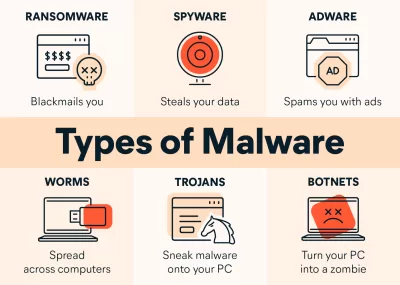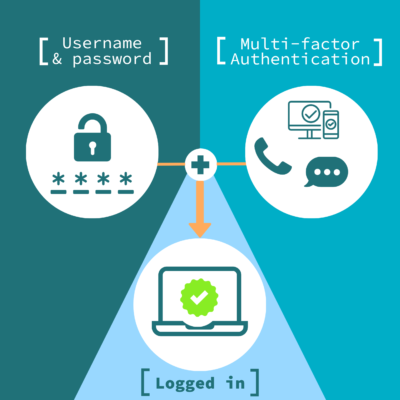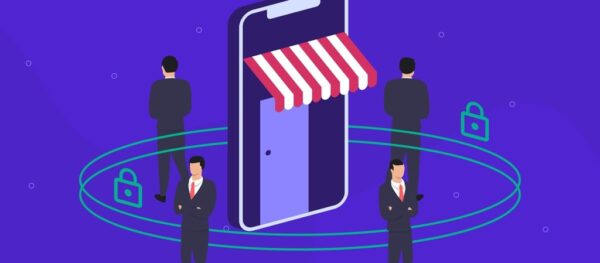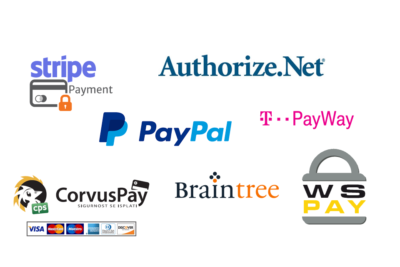Ecommerce security is crucial when it comes to running an online business. Security should be at the forefront of your mind. With the increasing number of cyber threats and data breaches, it’s important to take the necessary steps to protect your customers’ data and your brand’s reputation. By implementing strong e-commerce security measures, you can build trust with your customers and ensure that their personal information is safe.

One of the biggest concerns for any e-commerce business is the security of customer data. According to Statista, the ecommerce industry incurred a loss of $41 billion in 2022 as a result of payment fraud. Ecommerce security requires that from credit card information to personal details, customers trust you to keep their data safe. A data breach can not only harm your customers but can also damage your brand’s reputation. That’s why it’s crucial to have a solid ecommerce security strategy in place.
In this article, we’ll explore the basics of e-commerce security and provide you with tips and best practices to protect your business. From secure payment gateways to website encryption, we’ll cover everything you need to know to keep your customers’ data safe and build trust in your brand.
1. Understanding ECommerce Security
As an ecommerce business owner, you need to ensure that your website is secure for your customers and that sensitive data such as credit card information, addresses, and other personal information is protected. In this section, we will discuss the different types of ecommerce threats and the importance of cybersecurity.
Types of ECommerce Threats
There are various types of ecommerce security threats that can affect your business. One of the most common threats is malware. Malware is malicious software that can infect your website and steal sensitive information. Malware can be spread through phishing emails, suspicious downloads, and other methods.

Another common ecommerce security threat is phishing. Phishing is a type of cyber attack where hackers create fake websites or emails that look like legitimate ones to steal sensitive information such as credit card numbers and login credentials. These attacks can be difficult to detect, so it’s important to educate your customers on how to identify phishing attempts.
DDoS (Distributed Denial of Service) attacks are another type of ecommerce security threat that can affect ecommerce businesses. DDoS attacks involve overwhelming a website with traffic to make it inaccessible. These attacks can be devastating for e-commerce businesses, leading to lost revenue and damage to reputation.
Importance of Cybersecurity
Cybersecurity is crucial for ecommerce businesses. Not only does it protect your customers’ sensitive data, but it also helps to build trust in your brand. By implementing proper cybersecurity measures, you can prevent data breaches, reduce the risk of fraud, and protect your business from financial losses.
To ensure ecommerce security for your website, you should implement a multilayer security approach. This includes using strong passwords, encrypting sensitive data, and regularly updating your software and security systems. You should also educate your customers on how to protect themselves from cyber threats and encourage them to use strong passwords and enable two-factor authentication.

In conclusion, ecommerce security is a critical aspect of running an online business. By understanding the different types of threats and implementing proper cybersecurity measures, you can protect your business and your customers from cyber attacks.
2. Securing Customer Data
When it comes to ecommerce security, protecting customer data is of utmost importance. As a business owner, it is your responsibility to ensure that your customers’ personal and financial information is kept secure. In this section, we will discuss some best practices for securing customer data.
Data Protection and Privacy Laws
Data protection and privacy laws such as GDPR (General Data Protection Regulation) and CCPA *California Consumer Privacy Act) are in place to protect the privacy of individuals. As an e-commerce business owner, it is important to be aware of these laws and ensure that your business is compliant.
GDPR, for example, requires businesses to obtain explicit consent from customers before collecting and processing their personal data. CCPA, on the other hand, gives customers the right to know what personal information businesses have collected about them and the right to have that information deleted.
Encryption and Data Security

Encryption is the process of converting data into a code to prevent unauthorized access. It is an essential component of data security. By encrypting sensitive data such as customer information, you can ensure that even if someone gains access to your data, they will not be able to read it. PCI DSS, a set of security standards for businesses that handle credit card information, requires businesses to use encryption to protect customer data.
In addition to encryption, there are other measures you can take to secure customer data. For example, you can limit access to sensitive data by implementing role-based access control (RBAC). This ensures that only authorized users have access to sensitive data. You can also use firewalls and intrusion detection systems to detect and prevent unauthorized access to your network.
By following these best practices, you can ensure that your customers’ personal and financial information is kept secure. This will not only protect your customers but also help build trust and credibility for your business.
3. Authentication and Access Control
When it comes to ecommerce security, authentication and access control are two of the most critical components. These measures ensure that only authorized users can access sensitive information and perform actions on your website. This section covers two of the most important authentication and access control measures: password policies and multi-factor authentication.

Password Policies
One of the most basic forms of authentication is the use of passwords. Passwords are used to verify a user’s identity and grant access to sensitive information. However, weak passwords can be easily guessed or hacked, leaving your website vulnerable to attacks.
To ensure that your passwords are strong and secure, it’s important to implement password policies. Password policies should include the following best practices:
- Password length: Require passwords to be at least 8 characters long.
- Complexity: Require passwords to include a mix of uppercase and lowercase letters, numbers, and special characters.
- Regular updates: Require users to change their passwords every 90 days.
- Prohibit reuse: Prohibit users from reusing their previous passwords.
- Lockout: Implement account lockout policies that temporarily lock user accounts after a certain number of failed login attempts.
By implementing these password policies, you can ensure that your users’ passwords are strong and secure, reducing the risk of unauthorized access to your website.
Multi-Factor Authentication
Multi-factor authentication (MFA) is a more advanced form of authentication that requires users to provide two or more forms of identification to access their accounts. This could include something the user knows (like a password), something the user has (like a security token), or something the user is (like a biometric scan).

MFA provides an additional layer of security that makes it much more difficult for attackers to gain access to your website. Even if an attacker manages to guess or steal a user’s password, they won’t be able to access the account without the second form of identification.
Implementing MFA is a highly recommended ecommerce security best practice. By requiring users to provide multiple forms of identification, you can significantly reduce the risk of unauthorized access and protect your users’ sensitive information.
In summary, password policies and multi-factor authentication are critical components of ecommerce security. By implementing strong password policies and requiring multi-factor authentication, you can ensure that only authorized users can access your website and protect your users’ sensitive information.
4. Defending Against Specific Attacks
When it comes to ecommerce security, there are several specific attacks that you need to be aware of and take steps to defend against. Here are some of the most common types of attacks and how you can protect yourself:

Protection from Malware
Malware is a type of software that is designed to harm your computer or steal your personal information. It can be spread through email attachments, downloads, or even just by visiting a compromised website. To protect yourself from malware and ensure maximum ecommerce security, you should:
- Install antivirus software on your computer and keep it up to date.
- Be cautious about downloading files or opening email attachments from unknown sources.
- Keep your operating system and other software up to date with the latest security patches.
- Use a pop-up blocker to prevent malicious ads from appearing on your screen.
Preventing Phishing and Social Engineering
Phishing is a type of attack that involves tricking you into giving away your personal information, such as your login credentials or credit card details. Social engineering is a similar type of attack that involves manipulating you into doing something you shouldn’t, such as giving away sensitive information or downloading malware. To protect yourself from these types of attacks, you should:
- Be cautious about clicking on links in emails or messages from unknown sources.
- Look for signs that an email or message might be fake, such as spelling errors or unusual formatting.
- Avoid giving away sensitive information unless you are absolutely sure that it is necessary and legitimate.
- Use strong, unique passwords for all of your accounts and enable two-factor authentication whenever possible.
By taking these steps, you can significantly improve ecommerce security for your online business by reducing your risk of falling victim to these types of attacks and keeping your personal information and financial data safe and secure.
5. Building a Secure ECommerce Platform

When building an ecommerce platform, security should be a top priority. With the increasing number of cyberattacks, it’s important to take measures to protect your customers’ information. In this section, we’ll discuss some steps you can take to build a secure e-commerce platform.
Choosing the Right ECommerce Platform
Choosing the right ecommerce platform is crucial for building a secure online store. Look for a platform that offers built-in security features such as SSL certificates, two-factor authentication, and regular security updates. Some popular e-commerce platforms that offer these features include Shopify, WooCommerce, and Magento.
Before choosing a platform, make sure to do your research and read reviews to ensure that it meets your security requirements. Additionally, consider the platform’s reputation and track record for security.
Secure Payment Gateways and Transactions
One of the most important aspects of ecommerce security is ensuring secure payment gateways and transactions. Make sure to choose a payment gateway that is Payment Card Industry Data Security Standard (PCI DSS) compliant and offers encryption for sensitive information such as credit card numbers. Some popular payment gateways that offer these features include PayPal, Stripe, and Authorize.net.

In addition to using a secure payment gateway, ensuring ecommerce security for your business requires that transactions are encrypted using SSL certificates. SSL certificates encrypt data transmitted between a web server and a user’s browser, making it more difficult for attackers to intercept and steal sensitive information.
By choosing the right platform and implementing secure payment gateways and transactions, you can achieve high ecommerce security and build a secure online store that protects your customers’ information.






